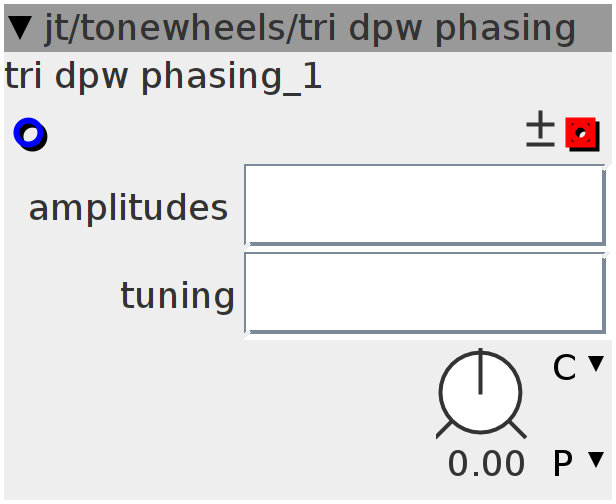tri dpw phasing
Triangle wave tonewheels The triangle wave oscillators use the 1st order DPW algorithm (against aliasing). Range is midi note 24 to 119.
Inlets
frac32 phase
Outlets
frac32buffer.bipolar sine wave
Parameters
frac32.s.map phase
Attributes
objref Table containing the amplitudes (32bit)
objref Tuning table
Declaration
class osc {
public:
void init();
};
class osc_one : public osc {
public:
uint32_t phase;
void init() { phase = 0; }
int32_t dpw_tri(int32_t phase) {
int32_t hphase = phase >> 1;
int32_t absnphase = phase > 0 ? -phase : phase;
return ___SMMLA(absnphase, phase, hphase);
}
void render(int32_t *pOut, int32_t amp, uint32_t freq, float invfreq) {
// pOut: pointer to s32 output buffer, adds values
// amp: s32 amplitude
// freq: s32 amplitude
// invfreq: inverse proportional to freq
int i;
int32_t a1 = (int)(invfreq * amp);
int32_t phase1 = phase;
int32_t prev1 = dpw_tri(phase1 - freq);
for (i = 0; i < BUFSIZE; i++) {
uint32_t v = dpw_tri(phase1);
int32_t d = (v - prev1);
*pOut = __SMMLA(d, a1, *pOut);
prev1 = v;
phase1 += freq;
pOut++;
}
phase = phase1;
}
};
static const int n_octaves = 8;
class chroma {
int phase;
public:
osc_one octaves[n_octaves];
void init() {
phase = 0;
int i;
for (i = 0; i < n_octaves; i++) {
octaves[i].init();
}
};
void render(int freq, int32_t *pOut, int32_t *pAmp, uint32_t x) {
pAmp += 24;
uint32_t f = freq;
float invfreq = (1 << 26) / (float)freq;
x = ___SMMUL(x, f);
int i;
for (i = 0; i < n_octaves; i++) {
octaves[i].render(pOut, *pAmp, f + x, invfreq);
pAmp += 12;
f = f << 1;
invfreq = invfreq * 0.5f;
}
}
};
chroma chromas[12];
Init
int i;
for (i = 0; i < 12; i++) {
chromas[i].init();
}
Control Rate
int i;
// clear
for (i = 0; i < BUFSIZE; i++) {
outlet_wave[i] = 0;
}
// sum into output buffer
for (i = 0; i < 12; i++) {
chromas[i].render(attr_tuning.array[i] >> 3, &outlet_wave[0],
&attr_amplitudes.array[i],
(param_phase + inlet_phase) << 1);
}
// output gain
for (i = 0; i < BUFSIZE; i++) {
outlet_wave[i] = outlet_wave[i] << 2;
}